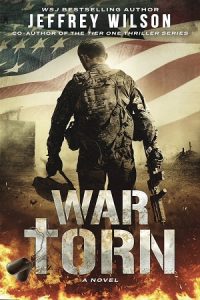Your previous novels have been bestsellers with general market publishers. However, War Torn has been harder to place with a publisher. Would you share some of the challenges you’ve had getting this book out to the public?
 Well, I’ve learned there are a lot of idiosyncrasies to the faith market for sure. When the book was done and my agent began to shop it, we started with faith publishers of course.
Well, I’ve learned there are a lot of idiosyncrasies to the faith market for sure. When the book was done and my agent began to shop it, we started with faith publishers of course.
We met a lot of resistance—not to the message, but to some of the content. We were told more than once by faith-based publishers that the graphic nature of the combat sequences may be too much for their readers. All of them loved the book, and several were insightful enough to admit that softening the trauma of the war time sections of the book would diminish the message, and they recommended that we keep looking for a home.
On the other hand, the mainstream publishers loved the story, but asked if I could soften the Religious message and focus on the PTSD. Which, of course, would defeat the purpose of the book—which is to share the message that the real hope for the crisis that occurs in war is in Jesus Christ and a closer relationship with God.
It was, to say the least, frustrating. I get that the mainstream houses are not really set up to sell in that market. And while understand the desire by the faith-based publishers to produce product they don’t feel will be poorly received, I’m still, like, “Hey—I’m a Christian and I lead a men’s military ministry, and I still watched the last Bourne movie and read Brad Taylor.” I guess my point is it felt a little maternalistic.
It was frustrating beyond belief. But each time I prayed about it, I had the overwhelming sense that God had it under control and that it would all work out in his time.
And it certainly has. Despite my frustration, this book is out now at the perfect time, where I am better equipped to support the message, the need has never been greater, and I have a platform I can use together with the book to get the message of hope out there in a way I couldn’t have before my other writing success.
Your author bio is chock-full of action hero type stuff! How did you go from doing all these things to becoming a novelist? How much of your experiences end up in your fiction?
 I get that question a lot! My mom worries that I just can’t keep a job.
I get that question a lot! My mom worries that I just can’t keep a job.
The truth is, all the amazing things I’ve had the opportunities to do have made me who I am as a writer and a Christian. Writing is actually the one consistent thread through it all.
While it seems like a leap to go from jet pilot and Naval officer deploying with the SEALs, etc., to writer, in reality I was a writer through all of it. I’ve written since I was a little kid, creating stories based on my favorite TV shows at first, then later creating my own stories and characters.
I was always a voracious reader, and that inspired my writing as well. I published my first short story at age 12 and then wrote shorts all along my whole life.
It was later that I attempted my first novel, believing before that I didn’t, perhaps, have the attention span for a full-length book. Honestly, it turns out that it’s a real luxury having 80,000 to 100,000 words to tell your story and grow your characters—way easier than doing it in 5000 words.
As for my experiences—they all find their way into my work. My characters are all amalgams of people I have known and my stories involved fictionalized versions of experiences I have had.
In War Torn, especially, my own struggles with finding God in the horrors of war are most definitely reflected on the pages—as are those of Wendy, helping me get through that time and dealing with her own fears.
Given your experiences, when you’re writing these kinds of books, do you ever have to do any kind of research?
Definitely, but less than some writers, perhaps. I know how to write about an infil by HUMVEE in Afghanistan or Iraq because I’ve done that. I know what it feels and smells like in CH47 Chinook or a Blackhawk. I know the people I’ve served with and how the react in situations.
I still look up some tech to stay current, and the geopolitics that find their way into our Tier One series require constant reading and research in a world that changes as fast as ours does.
Click thru to find out how Jeffrey’s faith impacts his role as a storyteller!


